Green gram
Green gram, also known as mung bean, is not new in South Asian countries, especially India. At least once in your life, you must have eaten a dish with mung dal. Although the legume is new to foreign countries, it has been part of the traditional Ayurvedic diet in India for thousands of years . Considered one of the most popular foods in India, green gram has been used since 1500 BC. Green gram is one of the sources of vegetable protein and has biological activities including antioxidant, antimicrobial, anti-inflammatory, home of lipid metabolism, antihypertensive, antihypertensive, antidiabetic and antitumor effects. It is a source of protein, fiber, antioxidants and phytonutrients
Meanwhile, the popularity of green gram is growing and the legume is used in everything from canned soups, restaurant dishes and protein powders. The legume is found in uncooked beans, as a dried powder, such as split peels, sprouts, and bean noodles. Green gram can be eaten dried, cooked, boiled, ground, and as flour. The great nutritional potential of gram makes it useful in the fight against many chronic diseases related to age as well as heart disease, cancer, diabetes and obesity. Various studies have been done investigating the health benefits of nuts and they are said to help prevent the onset of chronic diseases and reduce inflammation, among other various benefits.
Green Gram Nutrition Facts
Mung bean is one of the richest vegetable protein sources and one serving of this dal gives you 211 calories and 14.2 grams of protein. It is loaded with essential amino acids including phenylalanine, leucine, isoleucine, valine, lysine and arginine. Essential amino acids are not produced in the body and must therefore be supplemented through food. Green gram dal helps you meet your daily protein requirements without increasing fat intake.
According to the Journal of Food Science and Nutrition, this bean is packed with iron, folate, carotenoids, and other nutrients that support optimal health. On top of that, a serving of green gram dal contains 15.5 grams of dietary fiber, which is 70% of the recommended daily value. Adding green gram to the diet adds a lot, reduces the symptoms of constipation, diverticulosis, reduces cholesterol levels and the risk of developing heart disease.
In addition, it contains many useful elements such as manganese, magnesium, potassium, copper, phosphorus, zinc, and vitamins B1, B2, B3, B5, and B6. All mung beans are considered sprouts and are seen sprouting to change the cooking process. Sprouted green beans are low in calories, contain more amino acids and antioxidants than normal. It is full of many antioxidants such as phenolic acid, flavonoids, caffeic acid and cinnamic acid.
In addition, green shoots reduce the level of phytic acid, which is a nutrient that reduces the absorption of minerals such as zinc, magnesium and calcium.
Green Gram Gowing steps
Green Gram (Phaseolus vulgaris) is a versatile small bean. Green gram is a hardy and easy crop to grow. It grows best in hot weather and starts as a dwarf bean on a small pole or climbing vine.


Green gram is resistant to temperatures as low as -1 degrees Celsius and grows well at high temperatures of 15 to 20 degrees Celsius. Gram fruit is green, white in color, grows up to 3 mm in length and is cylindrical with flat sides.
Green gram comes in two types, one is the medium type and the other is the small variety. The main difference between these two species is their nutritional values, which are different. The vegetative form that is used as a green vegetable is harvested before it matures and can be stored for up to a year in a warm room.
Health Advantages of Green Gram
iron source
Green gram is also a good source of iron. Not getting enough iron in your diet has many health drawbacks. However, with green gram, you can meet your daily needs. One cup of green gram contains 2.83 milligrams, which is much more than red turkey. It is also rich in vitamin C which makes your body produce iron.
Protein warehouse
Green gram contains a lot of protein. Not only does this help you lose more weight, but it also helps you build lean muscles. If you think that muscles are built only in the gym, you are wrong! With Green Gram, you can get the best body you have ever dreamed of. One cup of green gram contains about 14 grams of protein. In other words, it is a better alternative compared to chicken or steak.
Circulatory Health
Moong is rich in fiber and antioxidants, which protect the heart by reducing bad cholesterol (LDL) levels. High cholesterol is a major cause of heart disease. Green gram also has antihypertensive properties and helps prevent high blood pressure and other related conditions.
Green Grams also contain many antioxidants that control cholesterol levels by eliminating free radicals, reducing inflammation, and repairing damage to blood vessels, thereby preventing strokes and heart attacks. Green gram helps improve blood circulation by relaxing the muscles.
Key point: green gram included in food can reduce the risk of heart disease and help prevent obesity, high cholesterol, high blood pressure, inflammation and oxidative stress, prevention against atherosclerosis, plates, etc.
Immunity booster
Green gram is rich in fiber, folate, B vitamins and protein, which help reduce inflammation. They also contain phytonutrients called isoflavones that have strong antioxidant properties and help boost immunity. Green gram is also a good source of iron, zinc, and vitamin B6, which is associated with boosting the immune system. All these foods help to increase the number of white blood cells, which help to defend the body against the attack of disease. Green gram is rich in threonine which can stimulate the immune system by increasing the production of antibiotics. Threonine produces serine and glycine which are important for the production of collagen, tissue and elastin. Therefore, it makes the muscles and tissue better and stronger by increasing the production of serine and glycine.
Green gram contains many antioxidants that provide protection against chronic diseases. Antioxidants found in green gram that remove free radicals in the body that cause chronic diseases and cell regeneration. Vitamin C in green gram is enough to boost the immune system. Key point: Green gram added to your diet can help improve your immunity due to the presence of immunity-boosting nutrients.
liver protection
Green gram can help prevent liver damage and reduce the accumulation of fat in the liver while increasing cholesterol clearance, while mung beans exhibit hepatoprotective effects.
Green gram is a source of protein, which is important for health and bones, but it also has a protective function for the liver. Bottom Line: Eating a gram of green leafy vegetables regularly can help improve your liver health.
Obesity Monitor
Green gram contains a lot of nutrients, combined with dietary fiber, perfect for those who are trying to lose weight. Dietary supplements and red lentils work as “producers” in the digestive system and increase satiety and reduce hunger and allow people to feel full long term and therefore reduces total calorie intake, which helps to reduce obesity. Nutrients help the body feel full longer by increasing the satiety hormone called cholecystokinin and can fight obesity.
Increasing consumption of vegetables like green gram reduces the risk of obesity, overall mortality, diabetes, heart disease, increased energy, and obesity. NOTE: High in fiber and protein in green gram and low in calories can help you lose weight.
Fight against cancer
Green gram is a good source of amino acids. Rich amino acids such as oligosaccharides and polyphenols prevent cancer. The antioxidant properties of mung beans are beneficial in protecting the body from DNA damage and dangerous cell mutations.
It also has antitumor effects. Flavonoids vitexin and isovitexin have the ability to destroy free radicals, which help reduce oxidative stress that can lead to the development of cancer.
Key points: The source of amino acids and flavonoids in green gram produce anti-tumor properties that can reduce the risk of cancer.
Controls blood pressure
High blood pressure is a major cause of heart disease and stroke, which is one of the leading causes of death. The potassium, magnesium and fiber content in green gram dal helps control blood pressure. Evidence also shows that the essential nutrients found in green gram dal play an important role in inhibiting the activity of enzymes that actually raise blood pressure. Moreover, it also prevents the oxidation of lipids and improves blood circulation in the vital organs.

